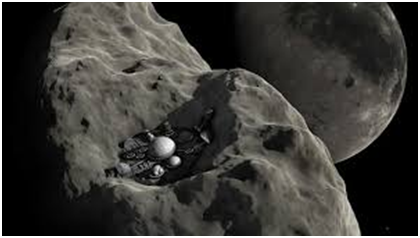My last blog was about the question of private ownership of celestial bodies by firms that mine asteroids. Current United Nation international space law prohibits any such ownership. There is a new bill named the ASTEROIDS Act pending in the U.S. Congress that would at least allow asteroid mining companies to own what they mine and return to Earth. This appears to be prohibited by internal space law.
One of the problems with current international space law is that the definition of "celestial body" is considered to be too vague by some critics. A review of international space law by the International Institute of Space Law decided that a celestial body under current space law was a "natural object in outer space...which cannot be artificially moved from its natural orbit." If this is actually the meaning of the term "celestial body" in space law, then if an asteroid is moved from its "natural orbit" it would cease to be covered by current space law. Although we currently are not able to move asteroids from their natural orbits, there has been a great deal of research on the subject.
NASA has announced the Asteroid Redirection Mission which would move an asteroid. If and when this occurs, the question of legal status of the asteroid will have to be settled. Moving one asteroid could result in the reclassification of other asteroids of similar size as not being covered under existing space law.
The second big question is the legal status and ownership of the resources recovered from asteroids by private organizations. According to space law, any materials brought back from celestial bodies must be shared among signatory nations. On the other hand, the lunar samples brought back by the United States and Soviet Union were bought and sold as private property. A British court ruled that the sale was legal and there was no challenge on the basis of space law.
Space law says that "Outer space, including the moon and other celestial bodies, shall be free for exploration and use by all states..." The meaning of the word "use" is definitely open to debate. It could mean mining but none of this is explicitly spelled out. Treaties, which form the basis for international space law, must be interpreted by the Vienna Convention but the Convention says nothing about mine or resulting materials that are brought back to Earth. The meaning of the work "use" will have to be determined by the intent of the whole body of space law and not just one section. Although the proposed ASTEROIDS Act being considered by Congress claims that it is in accord with international space law, that simple declaration does not make it so. Even if the sale of a few lunar samples did not raise concerns in the international space community, when there are potentially trillions of dollars of minerals to be recovered from asteroids, there will definitely be majors debates about the legality of private ownership of minerals obtained by asteroid mining.
